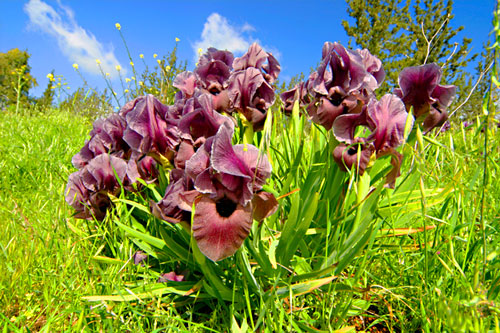27 Feb Thoughts About Tu B’shvat & Planting Trees

Turns out your tree planted in Israel might not be so good for the country or protecting nature.
Greetings from Israel as we get ready to celebrate Tu B’Shvat, the new year for trees.
The Jewish New Year for Trees in 2020, Tu B’shvat, will be celebrated by us and many Israelis starting on February 10th. It’s a reminder of spring’s renewal in the middle of winter. Lately, it also reminds us, if we are paying attention, of the need to live in harmony with nature. This Tu B’Shvat if you’d like to make a gift that truly helps Israel’s nature, click here
One of the four “new years” mentioned in the Mishna, Tu B’shvat was first celebrated by medieval Kabbalists with mystical seders of fruits and nuts, and today has been adopted by Jewish environmentalists as a day of general ecological awareness. The ritual most associated the holiday these days is tree-planting in Israel, which, alas, is actually harming Israel’s environment and biodiversity.
Is Planting Trees Really Good for the Environment?
As Israeli environmentalists have been warning for decades, we’ve been planting the wrong trees, the wrong way, in the wrong places for a long time.
Twice in recent years, my organization, the Society for the Protection of Nature in Israel, has succeeded in court to stop such ecologically harmful practices.
Now, SPNI‘s new study concludes unequivocally that, from an ecological perspective, the KKL-JNF’s traditional pine forests have done more harm than good. It’s not that Israel doesn’t need trees. We do, the planet does; they store carbon dioxide and provide shade to lower temperatures in a warming world. But we don’t need trees in naturally unforested open spaces, we need them in Israel’s urban heat islands.
The issue is complex, but in a paragraph, ecosystems with sparse tree cover – scrubland, loess, grasslands and calcareous sandstone areas — are among the most threatened ecosystems in the country. Planting trees in these sensitive ecosystems alters nature’s balance, having a negative effect on Israel’s unique biodiversity and on the ecological function of the region. By actively continuing this activity, the KKL-JNF is acting against Israel’s international commitments to protect biodiversity.
The negative ecological impacts of planted forests are not restricted to the planted area; the forest has harmful effects on nearby natural areas, including spread of toxic pine needles, invasive plants, and species into areas they shouldn’t be.
Worse, planted forests in these open areas do not contribute to the positive balance of climate change mitigation because of heat absorbed dark patches of the forest compared to the previous heat radiated back to space by light-hued environments (known as the albedo effect).
So this Tu B’shvat, please consider the science before you celebrate by planting (or sponsoring) a new tree in Israel.
Think of the Animals
In fact, this Tu B’Shvat, I’m already thinking about the next “new year” on the Jewish calendar, one I just heard about from the esteemed London environmentalist Rabbi Jonathan Wittenberg. The first day of the month of Elul on the Hebrew calendar, it turns out, is referred to by the same Mishna tractate as the “new year for the tithing of domesticated animals”. In light of our new understandings about the effects and horrific conditions of industrialized meat production, and in the dark shadow of the unfolding of the Sixth Mass Extinction event, by our hands — this is a re-branding just aching to happen: the New Year for Animals.
During the time of the Second Temple, this was a day on which shepherds determined which of their mature animals were to be tithed. The day is exactly one month before Rosh Hashanah, when a shofar made of a ram’s horn — hmmm — is blown to herald the traditional time of heshbon nefesh, a personal accounting.
In 2009, at the goat barn of the campus of a Jewish retreat center in Connecticut just minutes from my hometown, the festival began to be revived, first by Jewish animal protection advocates and environmental educators to raise awareness of the mitzvah of tsar baalei chayim (banning cruelty to live animals). The source texts inform Jewish ethical relationships with domesticated animals, and, today, the lived experience of animals impacted by human needs, especially in the industrial meat industry.
Since then, the rebranding of the New Year for Animals has been rolling out very slowly, apparently, because no one I’ve spoken to has ever heard about it. Maybe Tu B’shvat seders and tree-planting had a slow go in the early years too?
A Message for the Climate Change era
But this is a rebranding worth happening, a dusting off of an arcane tradition and its updating with an important Jewish message to ourselves and to the world for the next millennium: we share this planet with other living creatures – animals wild and domesticated – and we must, for heavens’ sake, and ours and theirs — do a much better job of looking out for them and their well-being.
Tu B’shvat is a great, ancient idea with potential today to bring much-needed awareness and action to crucial issues of ecology and sustainability. But we can’t celebrate the ecological message of this day meaningfully while the science clearly shows that planting trees the way we do in Israel is harmful to the planet, our nature and our native animals.
Chag Sameach, a meaningful happy holiday to everyone



